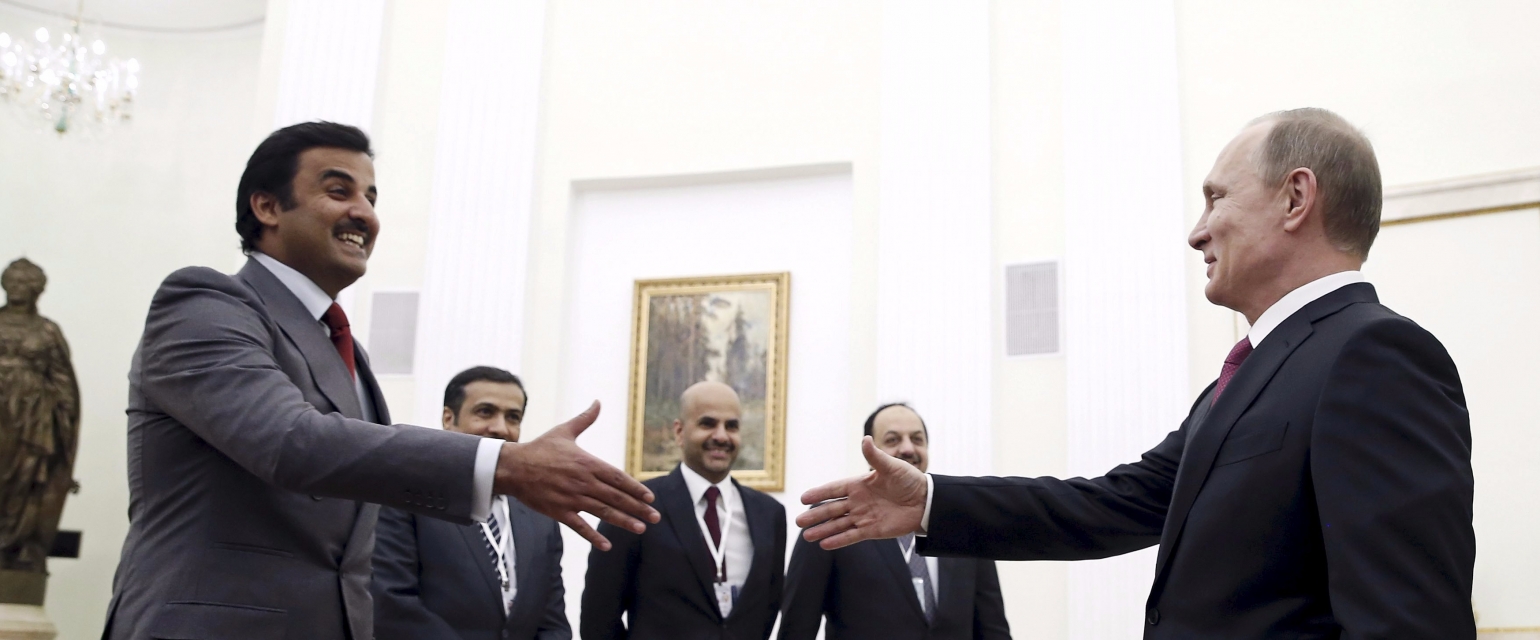

This week the main attention of Russian media was focused on the Davos Economic Forum, where the Russian delegation was surprisingly underrepresented. In its foreign policy, Moscow is increasingly demonstrating a greater willingness to develop the bilateral format of relations with all partners, rather than participating in multilateral political processes.
This focus on bilateral ties has been demonstrated by the recent meeting between the top two Russian and American diplomats – Sergey Lavrov and John Kerry – in Zurich, as well as the visit to Moscow of the Emir of Qatar, Tamim al-Thani.
Instead of going to Davos, Russians decided to work at home
During the business forum “Support of Russia,” Vladimir Putin joked:
“Everyone is here, so I do not know who actually went to Davos.” And then he added: “OK then! Let us get busy working at home!”
The Russian delegation was surprisingly underrepresented at this year’s economic forum in Davos. Deputy Prime Minister Yuri Trutnev, whose tasks in the Russian government are mainly related to the development of Siberia and the Far East, headed the Russian delegation.
Among Russian representatives, the weightiest delegation was that composed of bankers, which included German Gref (Sberbank), Andrey Kostin (VTB), Vladimir Dmitriev (Vnesheconombank). However, at the last moment, the governor of the Central Bank of Russia, Elvira Nabiullina, cancelled her planned visit. This was the case when it really was necessary to work at home.
Much was said at the forum about the need to normalize economic relations between Russia and Europe. In particular, an interesting statement was made by the chairman of the Munich Security Conference, Wolfgang Ischinger:
“I know the position of the German business circles, and these are all in favor of lifting sanctions against Russia today, not a year from now. Germany wants to see Russia as a stable economic partner.”
In general, such statements are not binding on politicians, but recently they have been sounded more often than ever before.
Finland’s Finance Minister, Alexander Stubb, noted that relations between Russia and the West have become much warmer than they were a year ago, and the head of French diplomacy, Laurent Fabius, stressed the need to work together to improve mutual relations. The desire to reduce tensions with Russia was also voiced at the forum by the Prime Minister of Georgia, Giorgi Kvirikashvili.
The one piece of good news from Davos was the latest results of international rankings of competitiveness, in which Russia made it into the Top 50. On the eve of the forum, Bloomberg had published its international innovation rating, in which Russia was listed in 12th place.
The meeting of Lavrov and Kerry in Zurich
The talks between John Kerry and Sergey Lavrov in Zurich became the first meeting between this pair in 2016. The discussion agenda included Syria, Ukraine and the North Korean nuclear program.
Continue reading at Russia Direct
Waning of the Ukrainian crisis may recreate conditions favourable for the meeting between the Russian and Georgian leaders. However, normalization in relations of the two countries has distinctly set limits, for the global strategy of the Georgian leadership remains unchanged.
Negotiations on the fate of the Russian humanitarian convoy of nearly 300 trucks, which has already been on the Russo-Ukrainian border for nearly a week, are drawing to a close. The sides have agreed on all issues related to customs clearances, and observers have not found any weaponry at all in the trucks.
U.S. and NATO will retain their influence on Kabul, due to the large amounts of financial aid on which the national budget depends, but the real question is: How hard will the new president work on finding an alternative to this source of financing? In Afghan society, there is a very strong anti-American sentiment, and therefore, there is a demand for closer ties with other countries, and even support for their confrontations with the United States.
We are truly glad to see Russia assert its rightful place in geopolitics after decades of other powers’ attempts to push it to the periphery. Zimbabweans have great sympathy for the Russian people, who like Zimbabweans are now suffering under the same kinds of sanctions that have and continue to hurt our economies. We are confident that such sanctions will not break the Russian spirit, as they have not Zimbabwe’s.